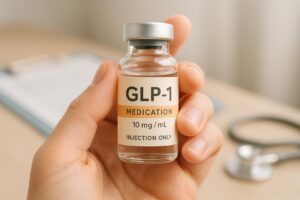How to Stop a GLP-1 and Not Regain Weight: Your Guide to Sustainable Weight Loss

Introduction
Did you know that nearly two-thirds of individuals who stop using GLP-1 medications like Ozempic and Wegovy regain the weight they lost within a year? This statistic highlights a profound challenge in the realm of weight management and underscores the importance of understanding how to maintain weight loss after discontinuing these medications.
GLP-1 receptor agonists have revolutionized weight loss strategies, providing significant results for many. However, the reality is that stopping these medications can lead to a daunting rebound in weight. The complexities of obesity as a chronic condition mean that long-term strategies are essential for sustaining progress. In this blog, we aim to explore effective methods for managing weight after stopping GLP-1 medications, drawing on insights from recent research, expert opinions, and our commitment at TrimRx to provide personalized weight loss solutions.
As we delve into this topic, we will cover the following aspects:
- Understanding the mechanisms of GLP-1 medications.
- The reasons behind weight regain after discontinuation.
- Effective strategies to maintain weight loss.
- The role of lifestyle changes and ongoing support.
- The importance of personalized care tailored to individual needs.
By the end of this post, you will have a deeper understanding of how to navigate the transition away from GLP-1 medications without regaining weight, empowering you on your weight loss journey.
Understanding GLP-1 Medications
GLP-1 medications, such as semaglutide (Ozempic, Wegovy) and tirzepatide (Mounjaro), mimic the action of a natural hormone called glucagon-like peptide-1. This hormone plays a crucial role in regulating appetite, digestion, and blood sugar levels. By enhancing feelings of fullness and reducing hunger, GLP-1 medications help many individuals achieve significant weight loss.
How Do GLP-1 Medications Work?
- Appetite Regulation: GLP-1 medications signal to the brain that the body is full, which can decrease overall food intake.
- Slowed Gastric Emptying: These medications slow down the rate at which food leaves the stomach, prolonging satiety and minimizing hunger pangs.
- Improved Insulin Sensitivity: By enhancing insulin action, GLP-1 medications can help regulate blood sugar levels, benefiting those with type 2 diabetes and obesity.
These medications have been shown to produce substantial weight loss, with clinical trials indicating average losses of around 15% of body weight over a year. However, their effectiveness is tied to continued usage, leading to the critical question of what happens when individuals stop taking them.
The Weight Regain Dilemma
When individuals stop using GLP-1 medications, many experience significant weight regain. Research shows that patients can regain up to two-thirds of their lost weight within a year of discontinuation. Understanding the reasons behind this phenomenon is vital for developing strategies to mitigate weight regain.
Why Does Weight Regain Occur?
-
Biological Response: Stopping GLP-1 medications can trigger a biological response that increases appetite and cravings. The body, adjusted to the effects of the medication, may react strongly to its absence.
-
Chronic Nature of Obesity: As acknowledged by health experts, obesity is a chronic disease that often requires ongoing treatment. Without the medication, the underlying mechanisms that promote weight gain may re-emerge.
-
Psychological Factors: The psychological aspects of weight management play a significant role. Many individuals may struggle with emotional eating or the return of cravings once the medication is stopped.
-
Lifestyle Factors: Discontinuing the medication often coincides with a decrease in adherence to healthy lifestyle practices. The absence of the medication’s appetite-suppressing effects may lead to a return to previous eating habits.
Understanding these factors is the first step toward developing effective strategies that can help individuals maintain their weight loss after stopping GLP-1 medications.
Effective Strategies to Maintain Weight Loss
While stopping a GLP-1 medication can pose challenges, there are proactive steps we can take to minimize weight regain and promote sustainable weight management. Here are some strategies that may help:
1. Gradually Tapering Off the Medication
Recent research suggests that gradually reducing the dosage of GLP-1 medications, rather than stopping abruptly, may help mitigate the rebound effects on appetite and cravings. This tapering approach allows the body to adjust more smoothly to the absence of the medication.
2. Emphasizing Lifestyle Changes
-
Nutrition: Prioritize a balanced diet rich in whole foods, including fruits, vegetables, whole grains, and lean proteins. Foods high in fiber and protein can help maintain feelings of fullness, making it easier to manage weight.
-
Mindful Eating: Practicing mindful eating can enhance awareness of hunger and satiety cues. This approach encourages individuals to listen to their bodies and eat in response to true hunger rather than emotional triggers.
-
Physical Activity: Regular exercise is crucial for weight maintenance. Aim for at least 150 minutes of moderate-intensity aerobic activity per week, incorporating strength training exercises to build muscle mass, which can boost metabolism.
3. Seeking Support
Establishing a support system can significantly impact weight management after stopping GLP-1 medications. Working with healthcare professionals, registered dietitians, or weight loss coaches can provide valuable guidance and accountability.
-
Regular Check-Ins: Scheduling regular appointments with a healthcare provider can help monitor progress and address any challenges that arise.
-
Group Support: Joining a support group or community can create a sense of belonging and encouragement, making it easier to stay motivated.
4. Setting Realistic Goals
Setting achievable, realistic goals is essential for long-term success. Rather than aiming for drastic weight loss, focus on small, incremental changes that promote a healthier lifestyle.
- Celebrate Small Wins: Recognize and celebrate progress, no matter how small. This positive reinforcement can boost motivation and commitment.
5. Exploring Alternative Therapies
For some individuals, exploring alternative treatments may be beneficial after discontinuing GLP-1 medications. These could include behavioral therapy, nutritional counseling, or other medical interventions that support weight management.
6. Monitoring Health Markers
Regularly monitoring important health markers, such as blood pressure, cholesterol levels, and blood sugar, can provide insight into overall health and help identify any areas that require attention.
The Role of TrimRx in Your Weight Loss Journey
At TrimRx, we understand that every individual’s weight loss journey is unique. Our commitment to personalized care combines advanced medical science with compassionate support. Our clinically proven, individualized weight loss solutions are designed to help you achieve sustainable results.
Our services include:
- Comprehensive doctor consultations to assess your needs.
- Personalized treatment plans tailored to your unique journey.
- Continuous support and guidance throughout your weight loss experience.
If you’re considering or currently taking GLP-1 medications and are concerned about weight regain upon discontinuation, we encourage you to explore our free assessment quiz. This quiz can help determine your eligibility for our prescription weight loss medications, ensuring you receive the most effective and personalized care possible. Take the quiz today: TrimRx Free Assessment Quiz.
Our quick-access supplements, such as GLP-1 Daily Support and Weight Loss Boost, are also available to support your wellness during this transition.
Conclusion
Navigating the journey of weight loss after stopping GLP-1 medications may seem daunting, but with the right strategies and support, it is entirely possible to maintain your progress. By understanding the mechanisms behind these medications and implementing sustainable lifestyle changes, individuals can significantly reduce the risk of regaining weight.
At TrimRx, we are dedicated to empowering you on your weight loss journey through personalized, medically supervised solutions. Our empathetic approach ensures that you receive the support you need to thrive, no matter where you are on your path to better health.
Remember, weight management is a lifelong commitment, and we’re here to support you every step of the way. If you have any questions or need guidance, don’t hesitate to reach out to our team of experts.
FAQ
Can I maintain weight loss after stopping GLP-1 medications?
While many individuals regain weight after discontinuation, implementing lifestyle changes, seeking support, and gradually tapering off medications can help maintain weight loss.
What lifestyle changes should I focus on after stopping GLP-1 medications?
Prioritize a balanced diet rich in whole foods, engage in regular physical activity, practice mindful eating, and seek support from healthcare professionals or support groups.
How can TrimRx help me with my weight loss journey?
TrimRx offers personalized weight loss programs that include comprehensive consultations, treatment plans, and ongoing support to help you achieve and maintain your goals.
Are there alternatives to GLP-1 medications for weight management?
Yes, alternatives may include behavioral therapies, nutritional counseling, and other medical interventions tailored to your needs.
How can I take the first step toward personalized weight loss solutions?
Complete our free assessment quiz to determine your eligibility for our prescription weight loss medications and discover how TrimRx can support you on your journey. Take the quiz here: TrimRx Free Assessment Quiz.
By embracing a holistic approach to weight management, we can work together to achieve sustainable results and a healthier future.

Transforming Lives, One Step at a Time
Keep reading
Tracking Progress With GLP-1: What To Measure
Learn which metrics to track on GLP‑1 therapy—weight, waist, blood sugar, lipids, side effects, and non‑scale wins—and how often to monitor them.
Fatigue Solutions for Ozempic and Wegovy Users
Hydration, protein-rich meals, light activity, and better sleep can reduce medication-related fatigue and help maintain energy during weight-loss treatment.
GLP-1 Medication Side Effect Checker
Worried about GLP-1 medication side effects? Use our free checker for Semaglutide, Liraglutide, and more to learn what to expect and stay informed!



